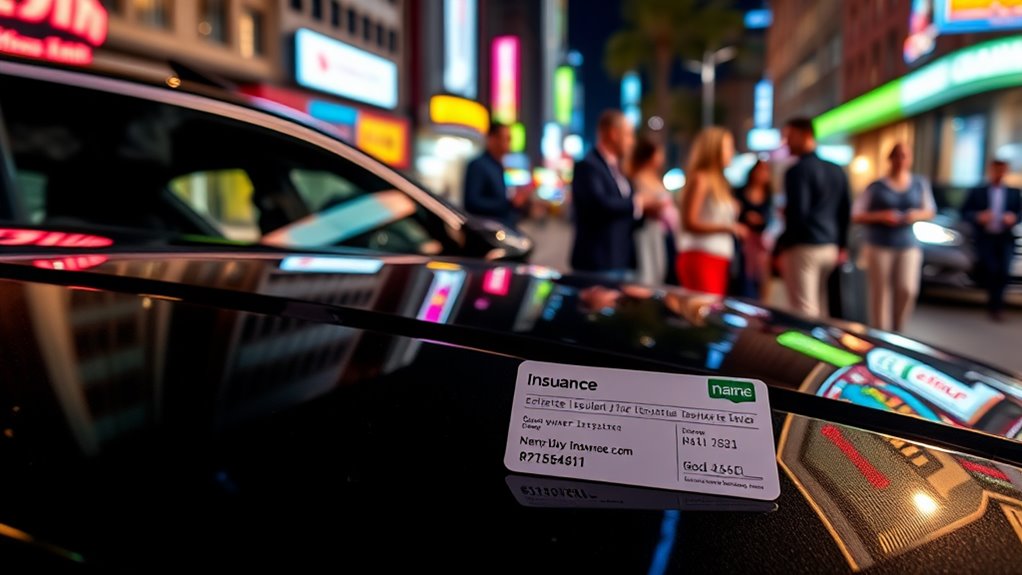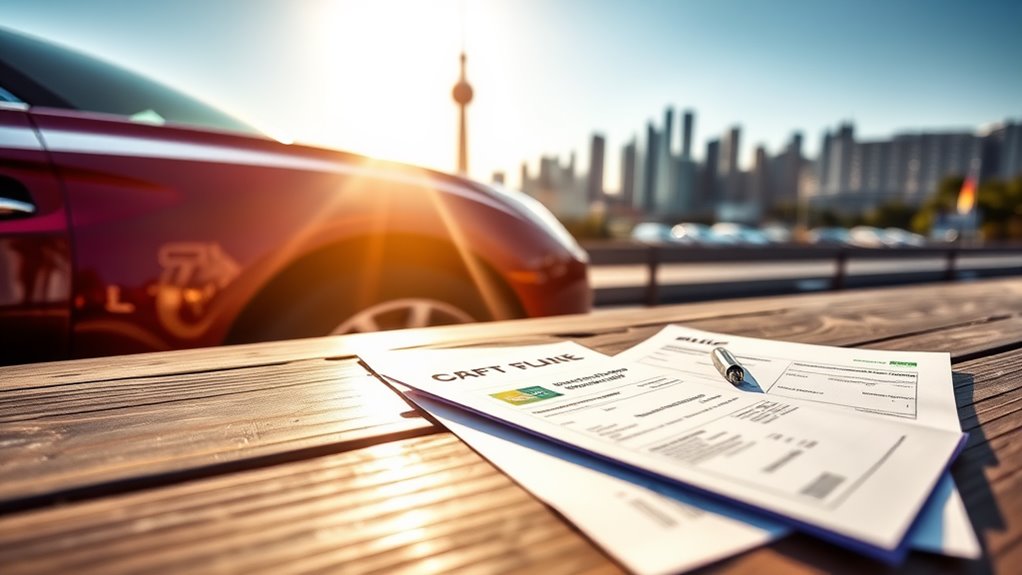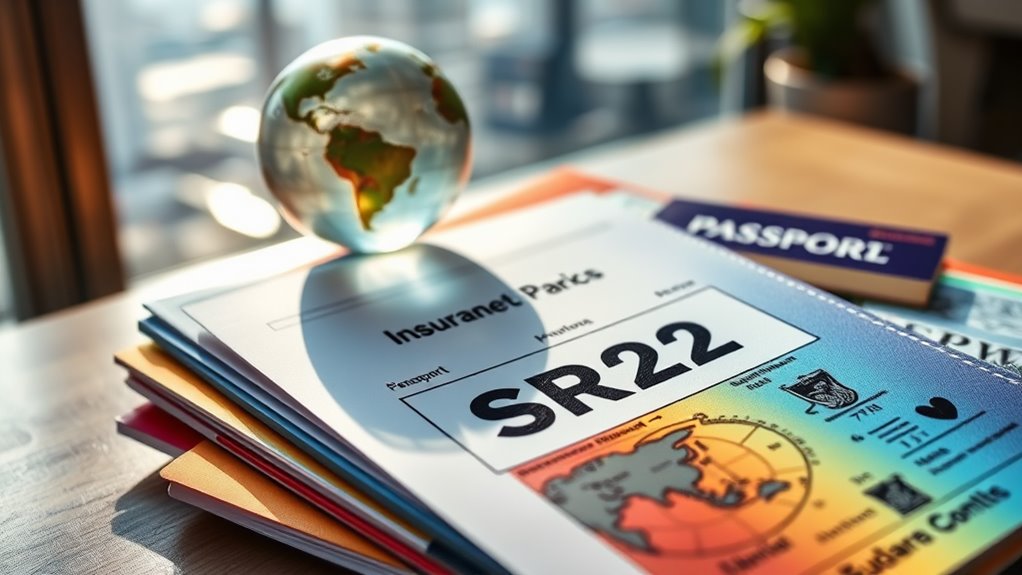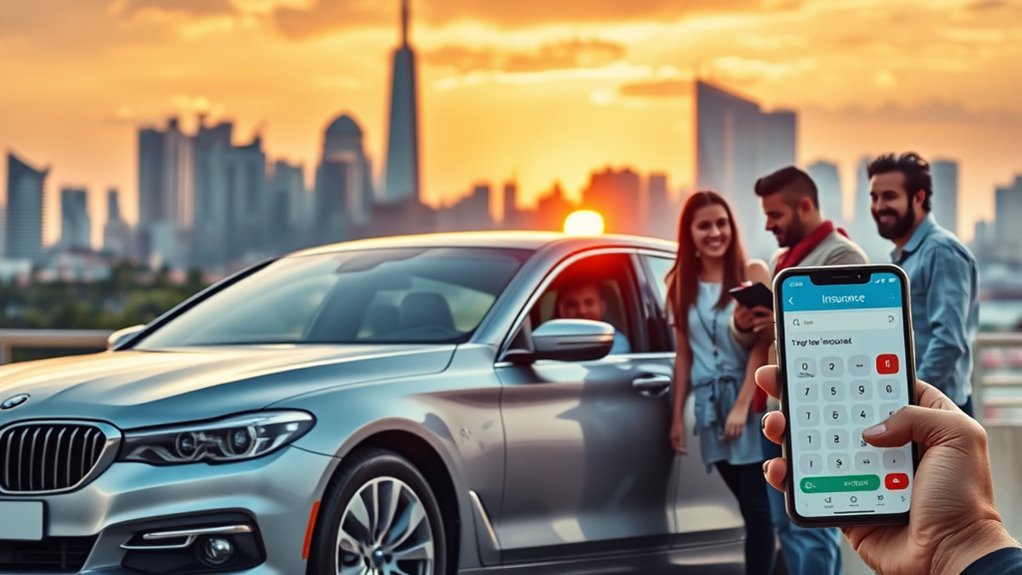Steering through SR22 insurance as a foreign driver can be complex, particularly when it comes to finding the right provider. With various options available, it is crucial to analyze how each company accommodates high-risk classifications and international documentation. Understanding these factors can greatly impact your experience and compliance with state regulations. Before making a decision, consider the unique offerings from top insurers that cater specifically to your needs.
Key Takeaways
- Progressive offers competitive rates and user-friendly online services tailored for foreign drivers needing non-owner SR22 insurance.
- Dairyland provides affordable premiums specifically designed for high-risk drivers, making it a viable option for foreign nationals.
- Hallmark accepts international documentation, ensuring seamless coverage and roadside assistance for foreign drivers.
- State Farm is known for its reliability and diverse customer service options, catering to the needs of high-risk foreign drivers.
- GEICO accepts international licenses and offers various discounts, making it an attractive choice for non-owner SR22 insurance.
Understanding Non-Owner SR22 Insurance for Foreign Drivers

When maneuvering the complexities of driving legally in the U.S. as a foreign driver, understanding non-owner SR22 insurance becomes essential if you've been classified as high-risk. This insurance is specifically for those without a vehicle who need to demonstrate financial responsibility after serious driving offenses. It provides liability coverage meeting state requirements, covering costs if you're involved in an accident while using a borrowed or rented vehicle. However, it won't cover vehicles owned by someone in your household. To qualify, you must hold a valid driver's license, though acceptance of foreign licenses varies by state. Furthermore, you'll need to file the SR22 form with the DMV to guarantee compliance and maintain your driving privileges. Additionally, it's important to note that minimum liability coverage is required regardless of vehicle ownership. Obtaining non-owner SR-22 insurance can be a vital step in re-establishing your driving record and compliance with state laws.
Benefits of Non-Owner SR22 Insurance for International Drivers
Non-owner SR22 insurance offers significant benefits for international drivers maneuvering the complexities of driving in the U.S.
With lower premiums compared to standard policies, this insurance allows you to manage your budget effectively while meeting legal requirements. It provides necessary liability coverage, ensuring compliance even without car ownership, which is essential for maintaining or reinstating driving privileges.
The flexible nature of non-owner SR22 insurance also accommodates driving borrowed or rented vehicles across various states, adapting to diverse insurance laws. Furthermore, it requires no U.S. driver's license initially, making it a practical choice for those without long-term vehicle plans.
Key Differences in SR22 Requirements for Foreign Drivers
Maneuvering SR22 requirements can be particularly challenging for foreign drivers due to specific regulations that differ from those applicable to U.S. residents.
Here are three key differences you should be aware of:
- Documentation Needs: Unlike U.S. residents, you'll need additional proof, such as a valid visa or ID, to meet the eligibility criteria.
- Higher Premiums: Expect insurance companies to charge elevated premiums since foreign drivers are often perceived as higher risk.
- Continuous Coverage: Maintaining uninterrupted SR22 coverage is essential; any lapse could result in license suspension and the need for reinstatement fees.
Understanding these nuances can help you navigate the SR22 landscape more effectively and guarantee compliance with Florida's requirements.
Top Insurance Providers for Non-Owner SR22 Coverage
Finding the right insurance provider for non-owner SR22 coverage is crucial, especially for foreign drivers needing to comply with specific regulations.
Progressive stands out with competitive rates and user-friendly online services.
Dairyland offers affordable premiums, particularly beneficial for high-risk drivers without a vehicle.
Hallmark caters specifically to foreign drivers, accepting international documentation while also providing roadside assistance.
State Farm is known for its reliability and diverse customer service, while GEICO accepts international licenses and offers various discounts.
When selecting a provider, consider key features like liability coverage, SR22 filing assistance, and the potential for discounts by bundling policies or demonstrating good driving habits.
Shopping around guarantees you find the best rates tailored to your needs.
How to Obtain Non-Owner SR22 Insurance as a Foreign Driver
Obtaining non-owner SR22 insurance as a foreign driver can seem challenging, especially given the specific regulations and eligibility criteria involved.
Here's how you can navigate the process:
- Contact insurers: Reach out to companies that specialize in non-owner SR22 policies and confirm they handle SR22 filings.
- Provide necessary documents: You'll need to present your valid driver's license and personal information during the application process.
- Guarantee continuous coverage: After purchasing the policy, the insurer will file the SR22 form with your state's DMV, so you must maintain coverage to avoid penalties.
This structured approach helps guarantee compliance with local laws and protects you from financial liabilities while driving non-owned vehicles.
Factors Affecting Premiums for Non-Owner SR22 Insurance
When evaluating non-owner SR22 insurance premiums, several key factors come into play that can greatly influence your costs. The type of violation requiring the SR22 greatly affects premiums; serious infractions like DUI lead to higher rates.
The type of violation requiring SR22 significantly impacts insurance premiums, with serious offenses like DUI resulting in higher rates.
Your driving history also matters—multiple offenses heighten risk perception, resulting in increased premiums. Additionally, state-specific minimum liability coverage requirements must be met, affecting overall costs.
Non-owner policies tend to be more affordable than owner policies, but you'll still face SR22 filing fees of $20 to $25. Different insurance providers assess risk uniquely, leading to varying rates.
Researching options is essential, as some insurers mightn't offer SR22 filings, limiting your choices and potentially impacting your costs.
Documentation Needed for Foreign Drivers Seeking SR22
What documentation do foreign drivers need to secure an SR22? To navigate the SR22 process effectively, you'll need to gather several key documents.
Here's what you should have ready:
- Proof of Insurance: Evidence of a valid car insurance policy that meets state requirements.
- Driver's License Information: Your driver's license number or another form of identification.
- Insurance Company Certificate: The SR22 form issued directly from your insurance provider.
Remember that requirements may vary by state, so guarantee compliance with local regulations.
It's essential to maintain continuous coverage throughout the SR22 period, typically lasting 2-3 years, to avoid any legal complications.
Challenges Foreign Drivers Face With SR22 Insurance
Maneuvering the complexities of SR22 insurance can present considerable challenges for foreign drivers in the U.S. Limited insurance providers often cater to your needs, making it tough to find suitable coverage.
Additionally, higher premiums linked to SR22 policies can strain your budget, especially without a U.S. driving history. State-specific regulations add another layer of complexity, as requirements vary considerably across jurisdictions.
Higher SR22 premiums can be a financial burden, particularly for those lacking a U.S. driving history and navigating varying state regulations.
Language barriers may hinder effective communication with insurers, complicating the process further. You might also face costly SR22 filing fees and the risk of policy cancellation if requirements aren't met.
Continuous coverage and timely renewals are essential to avoid penalties, putting further pressure on your ability to maintain compliance.
Comparing Quotes for Non-Owner SR22 Insurance
How can you guarantee you're getting the best deal on non-owner SR22 insurance? Start by comparing quotes from multiple providers to ascertain you're not overpaying.
Here are three key steps to follow:
- Assess Your Driving Record: Understand how violations like DUIs can increase your rates considerably.
- Evaluate State Requirements: Check your state's minimum coverage needs, as these can affect your premiums.
- Consult Insurance Brokers: They can provide access to a variety of insurers and help you navigate different policy options.
Ensuring Compliance With State Regulations for Foreign Drivers
While managing the complexities of state regulations, it's essential for foreign drivers to guarantee compliance with local SR-22 requirements.
Each state has distinct mandates regarding SR-22 certificates, which serve as proof of financial responsibility for high-risk drivers. You'll need to research specific regulations applicable to your state, as non-residents may also require documentation like an International Driving Permit.
Each state has unique SR-22 requirements for high-risk drivers, so it's vital to understand local regulations and necessary documentation.
Insurance companies typically file the SR-22 with the DMV on your behalf, ensuring that you adhere to legal requirements. Be aware that failing to maintain necessary coverage can lead to severe penalties, including license suspension.
Compliance periods usually last three to five years, dictated by the severity of violations, so staying informed is crucial for maintaining legal driving status.
Conclusion
In summary, while traversing SR22 insurance as a foreign driver may seem intimidating, it's entirely manageable with the right information and providers. You might worry about high costs, but many insurers like Progressive and Dairyland offer competitive rates tailored for international drivers. By understanding the requirements and comparing quotes, you can find an affordable non-owner SR22 policy that meets your needs. Don't let the complexities discourage you—there are plenty of options to guarantee you're compliant and protected on the road.






